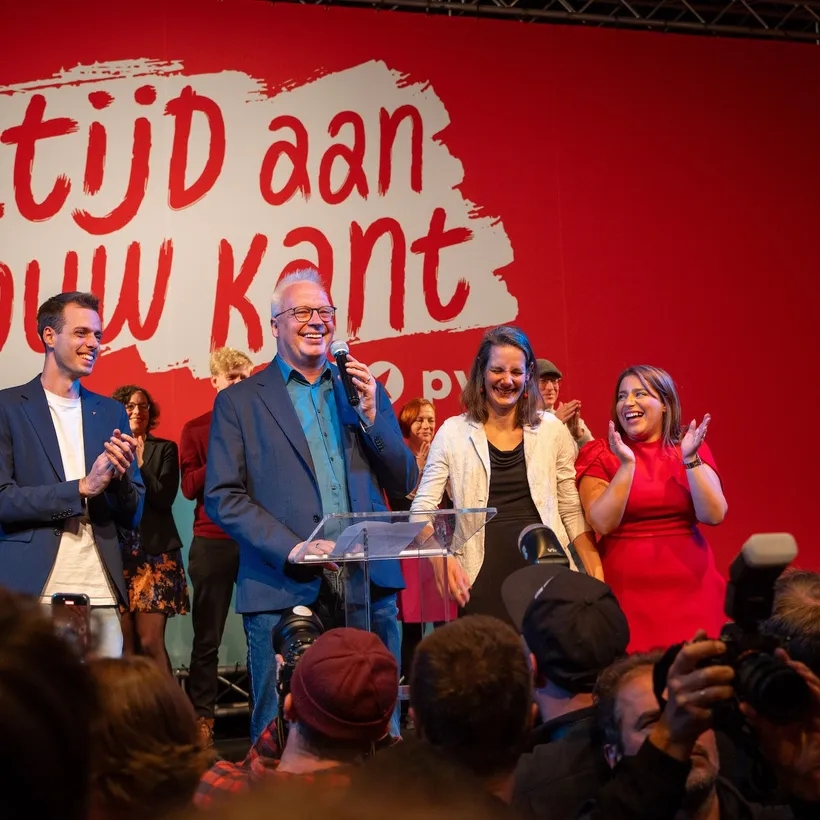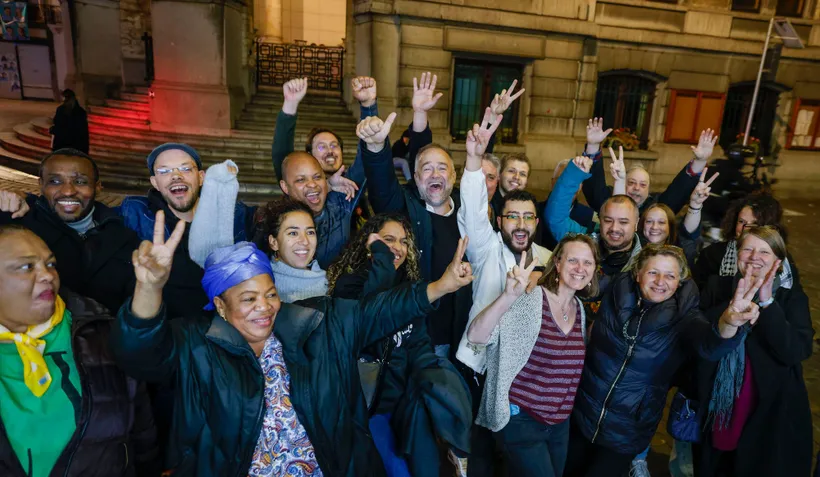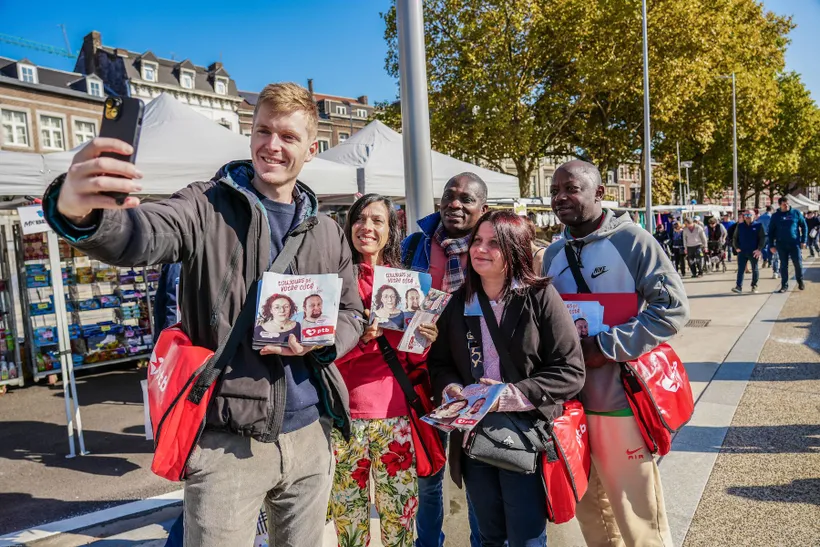The PVDA-PTB increases its number of local councillors from 169 to 258
After the municipal elections on October 13, PVDA-PTB General Secretary, Peter Mertens, takes stock. The PVDA-PTB is gaining ground in all three regions of the country, with many new local representatives, many of them workers and young people. This gives us hope and prospects for the future.
 A third of our elected representatives are workers, and one in six is under 30. This gives us a great outlook. The PVDA-PTB is gaining ground in Flanders, Brussels and Wallonia, going from 169 local elected representatives in 2018 to 258 today.
A third of our elected representatives are workers, and one in six is under 30. This gives us a great outlook. The PVDA-PTB is gaining ground in Flanders, Brussels and Wallonia, going from 169 local elected representatives in 2018 to 258 today.
We get our best scores in our country's industrial basins, and this election confirms it. With the industrial axis from Charleroi to Liège, where we scored over 18%, with the axis around the canal zone in Zelzate, working-class areas such as Genk, Mouscron and Ronse, and the historic Antwerp-Brussels axis via Boom, Mechelen and Vilvoorde.
Antwerp
In Antwerp, the second city of the country, some said that Bart De Wever (N-VA mayor) had no challenger. But then along came the immensely popular 32-year-old Jos D'Haese (PVDA-PTB). It's become a duel, a struggle between the past and the future.
We won 20% of the vote in Antwerp, by far the biggest gain in these elections. Who would have dared predict this a few years ago? The N-VA (Flemish right-nationalists) pulled out all the stops in Antwerp, importing all the world's conflicts to scare people. We can be proud of our performance in the face of this storm.
"These elections were not about Vlaams Belang (Flemish extreme-right party) - that's one of the lessons of the Antwerp laboratory", writes the major Flemish daily De Standaard. That's right.
This campaign focused on a possible progressive coalition. In Antwerp, the left-wing collectively reached 43.8%, which is unprecedented in the last fifty years. This provides a very solid foundation for the future.
Flanders
In the Flanders municipality of Zelzate, we achieved 21.7%, while the progressive coalition in which we participated reached 63% thanks to a very good result from Vooruit (Flemish social-democrats). In Borgerhout, we became the largest party, and there too, the progressive coalition (with Vooruit and Greens) grew stronger. In both Zelzate and Borgerhout, a continuation of progressive coalitions is possible.
In Vilvoorde and Mechelen, we tripled our number of elected representatives, and in Genk, we doubled it. In towns such as Ostend and Aalst, we won our first elected representative, as well as in Ronse, Boom, Asse, Mortsel, Dilbeek, Heist-op-den-Berg and Halle.
We've run an impressive campaign, but we've also encountered obstacles. In some towns, we were sandwiched between fierce battles between two candidates for the mayor's office, who were taking all the attention. And then there's the abolition of compulsory voting in Flanders. 30 to 40% of people did not go to the polls. Around 1.8 million Flemings stayed at home. This represents a historic weakening of local democracy. Shift workers and supermarket cashiers who couldn't vote, many young people who dropped out, the working classes who dropped out.
We must also consider our results in this context. Thanks to an incredible campaign, we've managed to mobilize a lot of people, and we're making progress overall in Flanders.
Brussels
 In the country's capital, we achieved impressive scores. In Molenbeek, we obtained 22% and in Forest, 21%, enabling the formation of progressive coalitions in these municipalities. In Saint-Gilles, we become the second largest political force with 24.4%, and for the first time we enter the Jette and Etterbeek municipal councils, with scores in excess of 10%.
In the country's capital, we achieved impressive scores. In Molenbeek, we obtained 22% and in Forest, 21%, enabling the formation of progressive coalitions in these municipalities. In Saint-Gilles, we become the second largest political force with 24.4%, and for the first time we enter the Jette and Etterbeek municipal councils, with scores in excess of 10%.
In most of the large municipalities in the Brussels region, we are helping to make the left a majority force: Brussels-City, Schaerbeek, Saint-Gilles, Molenbeek, Anderlecht, Forest, Ixelles... We are now working to translate this into communal majorities wherever possible.
Wallonia
In the French-speaking part of the country, some predicted a landslide victory for Georges-Louis Bouchez, but the MR president missed his bet: the MR (French-speaking neoliberal party) didn't win in Mons, nor anywhere else in Wallonia or Brussels. In these major cities, we've gone from strength to strength, and we're becoming more and more of a force to be reckoned with. In most cases, we're ahead of the Engagés (former Christian-democratic party). In Liège, Charleroi and many parts of Brussels, we are neck-and-neck with the MR.
In Herstal, we achieved a very strong score of over 31%, and in Seraing, the PTB obtained 26%. In both Liège and Charleroi, Wallonia's two largest cities, the PTB is up by 2%, and we have reached 18%. In La Louvière, we reach 19.4%. In Mouscron, we ran for the first time and immediately became the second party with 20%.
I'd also like to take my hat off to our comrades in Mons, who managed to make progress and win a seat in a city where the duel between Bouchez and PS mayor Nicolas Martin monopolized all the attention. In Tubize, Binche, Châtelet, Fleurus, Sambreville and Ath, we win our first elected representatives.
79 blue- and white-collar workers, and 40 young people under the age of 30
There was a time when the PVDA-PTB was known only through Peter or Raoul. Then Jos and Sofie came along, and now we're working on a whole new generation of spokespeople, many of them young and hard-working.
In Charleroi, our head of list Pauline Boninsegna, 33, stood out, as did Mathieu Marchal, a 36-year-old construction worker. They became the faces of the PTB in Charleroi. In Leuven, Anton Nilis joins the city council. At 29, he is one of the youngest heads of list in Leuven. In Ghent, young activist Julie Steendam joins our local group.
Our party now has 258 local councillors, including 79 male and female workers, and 40 young people under the age of 30.
We're sending Ivan Heyligen, a dockworker, to the Antwerp town council; an Ikea trade unionist to the Vilvoorde town council with Farah Boukachkach; a metal worker Dirk Vanmassenhove to the Ostend town council; a steelworker to the Charleroi town council, Ali Atici; a nurse to the Namur town council, Régine Gattegno. Kubra Sertkaya, a worker, joins Gaby Colebunders on the Genk municipal council.
We are also sending a large group of young elected representatives to the councils: In Antwerp, Manal Toumi achieves an incredible score; in Renaix, it's Nawras Jebara, a 20-year-old woman of Palestinian origin; in Dilbeek, we have Louis Clément, a young cartoonist; in Namur, Eline Bouillon, a philosophy student; in La Louvière, RedFox host Joyce Mukangoga, 21, and so on. With them, we lay the foundations for the future.
The fruit of fieldwork
 It's about much more than elections. From Renaix to Herstal, from Ostend to Genk, our local sections gave their all. We are a people's party. When it comes to neighborhood work, the PTB is far more advanced than the other parties," explains a political science professor in a newspaper. In this way, they can pick up the society's signals directly."
It's about much more than elections. From Renaix to Herstal, from Ostend to Genk, our local sections gave their all. We are a people's party. When it comes to neighborhood work, the PTB is far more advanced than the other parties," explains a political science professor in a newspaper. In this way, they can pick up the society's signals directly."
"It's an army the other parties are probably jealous of. "This is how a journalist describes the work of local PVDA-PTB sections in the daily De Standaard.
14,000 people actively participated in our field campaign: door-to-door canvassing in the neighborhoods, countless conversations, tens of thousands of call center hours, preparing soup and toast for the volunteers. Without this passion and commitment, the PVDA-PTB does not exist. During the campaign, 500 new members joined us, and our door is wide open to anyone who wants to join.
We're building a force that's here to stay, in the field. I truly believe that collective strength is the only way to move forward and build for the long term. Everyone works for everyone, in solidarity, as we did during the floods, as we do with ‘Hiver solidaire’ (Winter of Solidarity), and as we have done for a long time with Médecine pour le Peuple (Medicine for the People).
He who looks down will never see the sun. We look up, we look forward, step by step, we are building a social alternative on the ground, together with you.